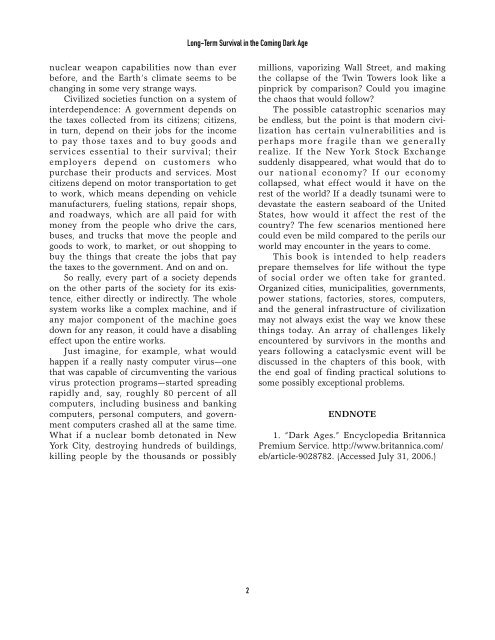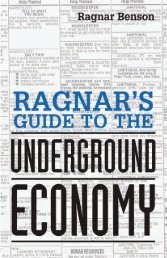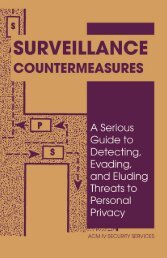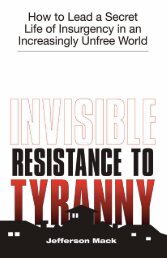to read a free sample chapter from this book. - Paladin Press
to read a free sample chapter from this book. - Paladin Press
to read a free sample chapter from this book. - Paladin Press
Create successful ePaper yourself
Turn your PDF publications into a flip-book with our unique Google optimized e-Paper software.
Long-Term Survival in the Coming Dark Age<br />
nuclear weapon capabilities now than ever<br />
before, and the Earth’s climate seems <strong>to</strong> be<br />
changing in some very strange ways.<br />
Civilized societies function on a system of<br />
interdependence: A government depends on<br />
the taxes collected <strong>from</strong> its citizens; citizens,<br />
in turn, depend on their jobs for the income<br />
<strong>to</strong> pay those taxes and <strong>to</strong> buy goods and<br />
services essential <strong>to</strong> their survival; their<br />
employers depend on cus<strong>to</strong>mers who<br />
purchase their products and services. Most<br />
citizens depend on mo<strong>to</strong>r transportation <strong>to</strong> get<br />
<strong>to</strong> work, which means depending on vehicle<br />
manufacturers, fueling stations, repair shops,<br />
and roadways, which are all paid for with<br />
money <strong>from</strong> the people who drive the cars,<br />
buses, and trucks that move the people and<br />
goods <strong>to</strong> work, <strong>to</strong> market, or out shopping <strong>to</strong><br />
buy the things that create the jobs that pay<br />
the taxes <strong>to</strong> the government. And on and on.<br />
So really, every part of a society depends<br />
on the other parts of the society for its existence,<br />
either directly or indirectly. The whole<br />
system works like a complex machine, and if<br />
any major component of the machine goes<br />
down for any reason, it could have a disabling<br />
effect upon the entire works.<br />
Just imagine, for example, what would<br />
happen if a really nasty computer virus—one<br />
that was capable of circumventing the various<br />
virus protection programs—started sp<strong>read</strong>ing<br />
rapidly and, say, roughly 80 percent of all<br />
computers, including business and banking<br />
computers, personal computers, and government<br />
computers crashed all at the same time.<br />
What if a nuclear bomb de<strong>to</strong>nated in New<br />
York City, destroying hundreds of buildings,<br />
killing people by the thousands or possibly<br />
millions, vaporizing Wall Street, and making<br />
the collapse of the Twin Towers look like a<br />
pinprick by comparison Could you imagine<br />
the chaos that would follow<br />
The possible catastrophic scenarios may<br />
be endless, but the point is that modern civilization<br />
has certain vulnerabilities and is<br />
perhaps more fragile than we generally<br />
realize. If the New York S<strong>to</strong>ck Exchange<br />
suddenly disappeared, what would that do <strong>to</strong><br />
our national economy If our economy<br />
collapsed, what effect would it have on the<br />
rest of the world If a deadly tsunami were <strong>to</strong><br />
devastate the eastern seaboard of the United<br />
States, how would it affect the rest of the<br />
country The few scenarios mentioned here<br />
could even be mild compared <strong>to</strong> the perils our<br />
world may encounter in the years <strong>to</strong> come.<br />
This <strong>book</strong> is intended <strong>to</strong> help <strong>read</strong>ers<br />
prepare themselves for life without the type<br />
of social order we often take for granted.<br />
Organized cities, municipalities, governments,<br />
power stations, fac<strong>to</strong>ries, s<strong>to</strong>res, computers,<br />
and the general infrastructure of civilization<br />
may not always exist the way we know these<br />
things <strong>to</strong>day. An array of challenges likely<br />
encountered by survivors in the months and<br />
years following a cataclysmic event will be<br />
discussed in the <strong>chapter</strong>s of <strong>this</strong> <strong>book</strong>, with<br />
the end goal of finding practical solutions <strong>to</strong><br />
some possibly exceptional problems.<br />
ENDNOTE<br />
1. “Dark Ages.” Encyclopedia Britannica<br />
Premium Service. http://www.britannica.com/<br />
eb/article-9028782. (Accessed July 31, 2006.)<br />
2

















